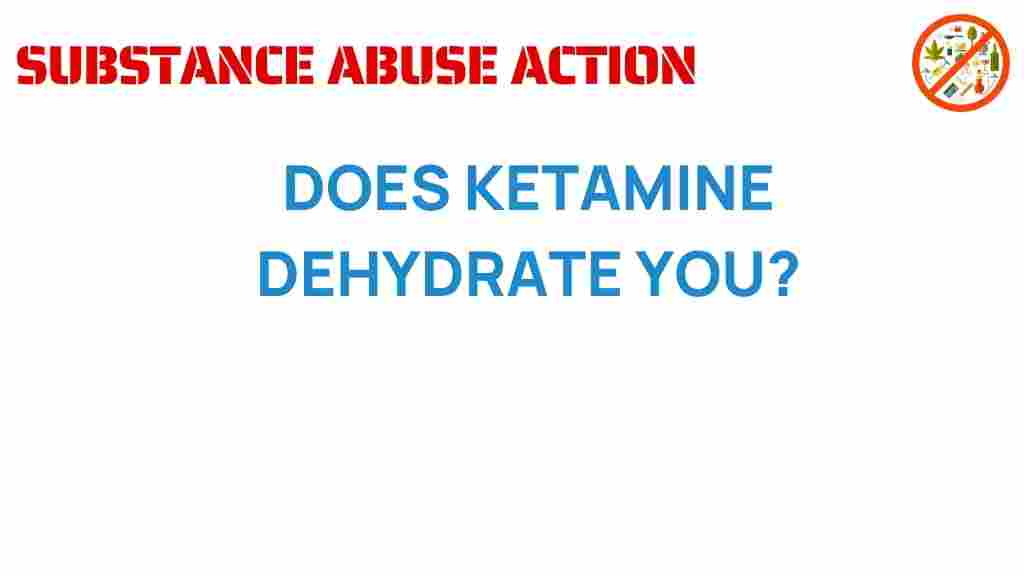The Hidden Truth: Does Ketamine Dehydrate You?
Ketamine has gained attention in recent years, not only for its anesthetic properties but also as a treatment for various mental health issues, including depression and anxiety. However, with its growing popularity comes a myriad of questions regarding its effects and side effects. One common concern among users and healthcare professionals alike is whether ketamine can lead to dehydration. In this article, we will explore the potential relationship between ketamine and dehydration, as well as the implications for mental health treatment, wellness, and recovery.
Understanding Ketamine
Ketamine is a dissociative anesthetic that has been used in medical settings for decades. It works primarily as an NMDA receptor antagonist, which means it interferes with the action of a neurotransmitter called glutamate. This mechanism is thought to contribute to its rapid antidepressant effects, making it a promising option for treating severe depression, PTSD, and chronic pain.
The Link Between Ketamine and Dehydration
To understand whether ketamine causes dehydration, we first need to look at how the drug affects the body. Ketamine can influence various bodily systems, and some users report experiencing side effects that may hint at dehydration.
- Increased Urination: Some studies suggest that ketamine can lead to increased urination, which may contribute to fluid loss.
- Dry Mouth: A common side effect of ketamine is dry mouth, which can make users feel dehydrated.
- Nausea: Nausea and vomiting can also occur after ketamine administration, leading to further fluid loss.
While these side effects can suggest a risk of dehydration, it is essential to consider the overall context in which ketamine is used. Dehydration is not listed as a primary side effect of ketamine, but the secondary effects can lead to fluid imbalance if not managed properly.
Signs of Dehydration
Recognizing the signs of dehydration is crucial, especially for individuals undergoing ketamine treatment. Common symptoms include:
- Thirst
- Dry mouth and throat
- Dark yellow urine
- Fatigue
- Dizziness or lightheadedness
If you are undergoing ketamine treatment and experience any of these symptoms, it is vital to address them promptly.
Managing Dehydration During Ketamine Treatment
For individuals receiving ketamine infusions or treatments, managing hydration is crucial for overall wellness and recovery. Here are some steps to ensure proper hydration:
1. Stay Hydrated Before Treatment
Before undergoing ketamine treatment, make sure to drink plenty of fluids. Water is the best choice, but electrolyte-rich beverages can also be beneficial. Consider the following:
- Drink at least 8-10 glasses of water a day.
- Incorporate fruits and vegetables with high water content, such as cucumbers and watermelon.
2. Monitor Fluid Intake During Treatment
If receiving ketamine in a clinical setting, inform your healthcare provider about any concerns regarding hydration. They may offer you water or electrolyte drinks during the treatment.
3. Hydrate After Treatment
After your ketamine session, continue to hydrate. This is especially important if you experience side effects like nausea or dry mouth:
- Drink water or rehydration solutions.
- Avoid caffeine and alcohol, as they can contribute to dehydration.
4. Listen to Your Body
It’s essential to pay attention to your body’s signals. If you feel thirsty or notice any signs of dehydration, take action immediately. Dehydration can hinder your recovery and affect your mental health treatment.
Side Effects of Ketamine Treatment
While ketamine can be an effective treatment for mental health conditions, it is essential to be aware of its potential side effects beyond dehydration. Common side effects include:
- Hallucinations
- Drowsiness
- Increased blood pressure
- Confusion
- Changes in perception
Although many of these side effects are transient and subside shortly after treatment, it is crucial to have a supportive environment during recovery. If you experience severe or persistent side effects, contact your healthcare provider.
Addressing Addiction and Recovery
Another critical aspect of ketamine use is the potential for addiction. While ketamine is not classified as a traditional addictive substance, some users may develop a psychological dependence on its effects. This can lead to misuse, especially outside of medical settings.
1. Understanding the Risks
In order to promote safe use of ketamine, it is vital to understand the risks associated with its misuse. Psychological dependence can lead to:
- Increased tolerance, requiring higher doses for the same effect.
- Withdrawal symptoms when not using ketamine.
- Neglect of responsibilities and relationships.
2. Seeking Professional Help
If you or someone you know is struggling with ketamine addiction, it is important to seek professional help. Treatment options may include:
- Counseling and therapy
- Support groups
- Medication for withdrawal symptoms
Recovery from ketamine addiction is possible, and support from mental health professionals can be invaluable.
Conclusion
In conclusion, while ketamine is an effective treatment for various mental health conditions, it is essential to be mindful of its potential side effects, including dehydration. Staying hydrated before, during, and after treatment is crucial in promoting wellness and supporting recovery. If you notice any signs of dehydration or experience adverse effects from ketamine, consult with your healthcare provider.
As we continue to understand the complexities of ketamine treatment, it is vital to approach it with caution and respect. By staying informed and proactive, individuals can maximize the benefits of ketamine therapy while minimizing risks.
For more information on mental health treatments, consider checking out this resource on holistic approaches to mental wellness.
Additionally, if you are interested in further reading on the science behind ketamine, visit this link for comprehensive insights.
This article is in the category Treatment and created by SubstanceAbuseAction Team
